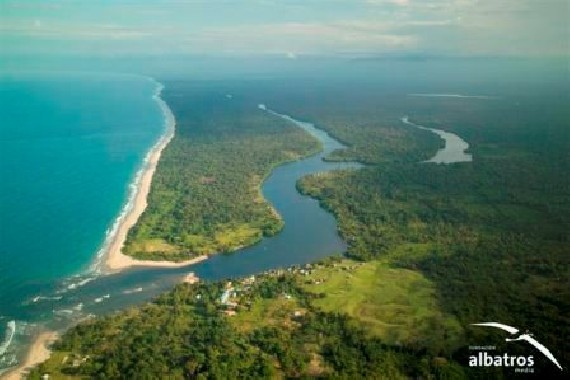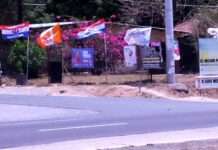
A trial and an arbitration over a land scheme
by Eric Jackson (most of this was broken in La Prensa over several years)
In 1997, after years of agitation and promises, the Pérez Balladares administration created the Ngabe-Bugle Comarca. There were complications. The Bugle — a minority that speaks Buglere rather than Ngabere which is itself divided among folks in the Veraguas highlands and along the Caribbean coast (the latter sometimes known as the Bokota) — were not all happy about being a minority within a larger indigenous entity. Ngabe politics are fractious. And then there were and are non-indigenous people living within to comarca, and pockets of indigenous populations that would not fit within a contiguous semi-autonomous commonwealth. When the comarca was created out of parts of Veraguas, Chiriqui and Bocas del Toro there were a few non-contiguous parts and guarantees for the property rights of the non-indigenous farmers and fishers already living within the entity’s boundaries.
Come 2004, the Panamanian government and the United Nations agreed to list more than 28,000 hectares of wetlands in the Ngabe-Bugle Comarca under the Ramsar Convention, an international treaty signed in Ramsar, Iran and designed to protect wetlands, particularly those of importance to migratory birds or of endangered species. Thus was born the Damani Guariviara Protected Area. Development that would adversely affect the wetland is prohibited there, as it is in all sites designated under the Ramsar accord.
Come March of 2010, one Feliciano Baker Valdes filed suit in a Bocas del Toro court to confirm squatters’ rights that he claimed to two beachfront parcels east of Rio Cañaveral, just under 220 hectares in all. Baker does not claim that he had rights of possession by actually having possessed the property. He says that he bought these rights in 2009 from attorney Evisilda Martínez.
Baker got Andino Archibold, the mayor of the comarca’s municipal district of Kusapin at the time, to sign off on his claim. The mayor would not have the authority to do this in any case, and the money claimed to have been paid did not register in the district’s accounts. Various third parties began offering the property, including an American who wanted to advertise it in The Panama News. University students from the comarca got wind of scheme and began to denounce it and Archibold. Residents of Kusapin began to complain to the regional government and others of helicopters frequently coming and going at the beach.
That June the two parcels, along with another adjacent 485 hectares, were sold by Baker to Desarrollo Ecoturistico Cañaveral, a company owned by Costa Rican legislator Antonio Álvarez Desanti. Mr. Álvarez Desanti is neither an ignoramus nor a back bencher. The attorney and businessman has twice presided over Costa Rica’s legislature. He was part of then President Laura Chinchilla’s delegation on a 2013 state visit with Ricardo Martinelli in the Palacio de las Garzas. In the 2018 presidential elections Álvarez Desanti will be the candidate of the National Liberation Party (PLN), one of his country’s historic major parties.
The Costa Rican politician said that his plan was to build a $40 million hotel on the beach. In a meeting with the now fugitive but then Martinelli administration tourism minister Salomón Shamah, the latter promised that if the permits were secured then there would be Panamanian government subsidies for the hotel project. Ricardo Martinelli’s cousin, attorney Francisco Martinelli Patton, handled the paperwork for the purported sale to Álvarez Desanti’s company.
In the Public Registry, the sale was said to be for $72,000. In a bank account set up by Baker to receive the payment from Álvarez Desanti, a $250,000 transaction was recorded. Whatever was claimed to have been paid by any party to the transaction to the municipality does not show up in any bank records.
In September of 2011 Willy Jiménez, the president of the Ño-Kribo Regional Congress (that is, overseeing the part of the comarca that used to be in the province of Bocas del Toro), filed a criminal complaint with the Public Ministry’s anti-corruption prosecutor. He cited falsified documents in local offices, including purported witnesses to prior possession of the property by persons who did not live in the area and never had. Afterward, however, Jiménez seemed to change his mind. The regional government signed an agreement with Álvarez Desanti’s company to approve the hotel. But by that time local residents were up in arms and filed their complaints against not only those whom Jiménez cited but also Jiménez himself.
But Martinelli’s minister of government, Jorge Ricardo Fábrega, came to the would-be developer’s defense. He said that the registered rights of possession to the property were not new and that in any case the beach is not part of the comarca so indigenous authorities or citizens have no standing to complain. By mid-2013 Álvarez Desanti was claiming that the complaints against the transactions and those involved had been dismissed.
A year later, Martinelli had lost his proxy re-election bid, all the paperwork for the project was not done and no public official was willing to sign or issue anything for the hotel project to proceed. Meanwhile the deal had already gone sour in the weeks before the 2014 elections, as the situation looked ugly enough to become an annoying campaign issue for the ruling Cambio Democratico party. In February of 2014 a local judge in Bocas opened a criminal investigation of the matter. The following month Álvarez Desanti filed for arbitration before a World Court panel in the United States, claiming that Panama had improperly stripped him of his property. He’s asking for $100 million in compensation.
Baker and Archibold go on trial for forgery and fraud on August 10. The arbitration case in pending.
So who’s making out like a bandit? Perhaps the US law firm of Hogan Lovells. This past May the Varela administration approved $3.77 million to hire them to fend off Álvarez Desanti’s claims before the World Court arbitration panel.
Background: one reason why we don’t do real estate ads
A digression about the evolution of our practices here. The Panama News does not take ads anymore, either paid display ads or the former free unclassifieds that we used to to. This story, in retrospect, is an illustration of one of the reasons why we don’t do that, apart from the primordial consideration that by going ad-free we can use certain content that is subject to cooperative commons restrictions that allow free use but not for commercial purposes.
Long about 2009, there was this American who wanted to place a real estate unclassified ad in The Panama News, seeking to sell a large tract of beachfront land east of Rio Cañaveral. But a faint bells rang from the past. Hey, isn’t this part of the Ngabe-Bugle Comarca, the lands of which are not supposed to be for sale to outsiders? Hey, isn’t this part of an internationally recognized and legally protected wetland area, more or less off-limits for developers?
Indeed — part of the Damani Guariviara Wetlands, protected by international treaty and nationl law in 2004. The Ministry of the Environment now, and its precursor the National Environmental Authority, then and now said and say that on the 24,089 hectare site there were and are no structures.
But this man said he had rights of possession and the approval of comarca authorities. Checking the man further, he was not registered to sell real estate in Panama and several people warned that he was a cut-out, a front for someone without rights or with very dubious rights to various properties trying to sell these to gullible foreigners. So his ad did not run. It was for the sale of the property that is the basis of the ongoing court cases discussed above.
We were not so quick to catch the one from the guy who was trying to sell a house in the Azuero to liquidate and conceal marital assets in the course of a divorce. He didn’t tell us that but SHE did and the ad came down. But the guy with the development in Boquete that was based on the appropriation of marital assets in violation of a US divorce decree? THAT angle was not known until after the fact, and his ads ran. But we routinely omitted the various ads for properties that allegedly included privately owned beaches, because that’s clearly illegal, no matter what the practices might be.
Looking up property titles and right of possession registries in this country is an arcane art, designed that way to provide income for lawyers and opportunities for swindlers in and out of public office. But there are rules of thumb. Rights of possession are essentially registered squatters’ rights, and such right depend on actual possession. To buy rights of possession to a parcel of land that nobody works, on which nobody grazes animals, on which no structure has been built is to buy from someone who is not in possession and thus has no interest to sell. It can get more complicated than that, but the abandonment of a property for which rights of possession are registered means that those rights are extinguished.
~ ~ ~
Estos anuncios son interactivos. Toque en ellos para seguir a las páginas de web











